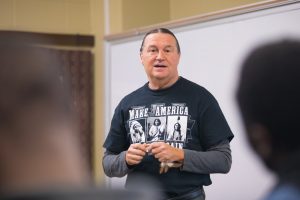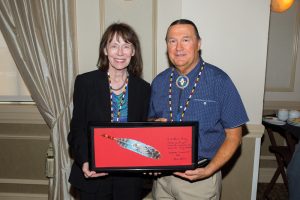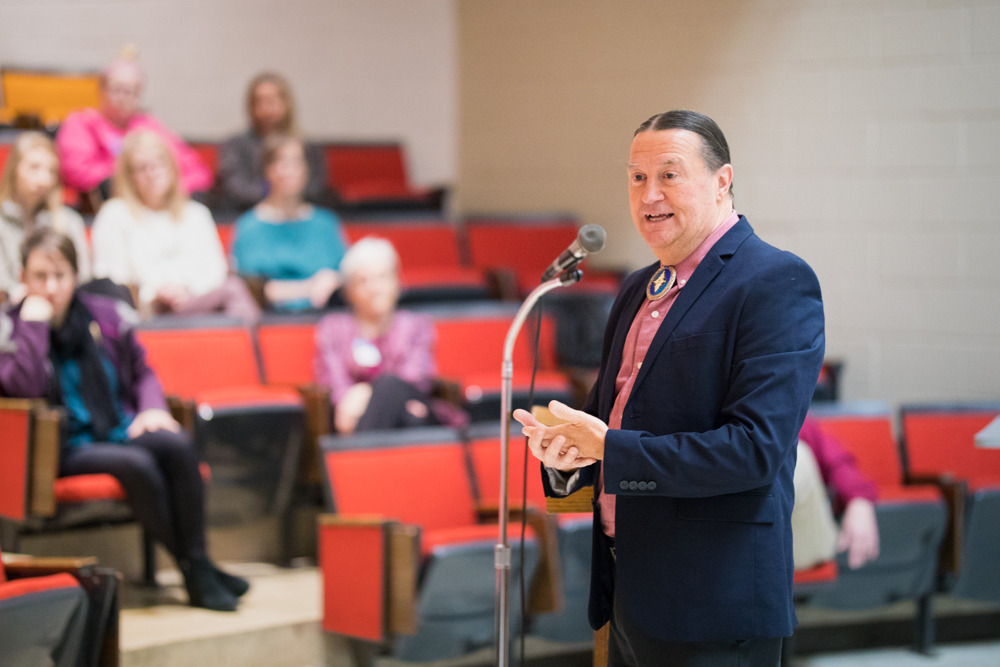Osiyo. Toe hee jah? Jon knee. Dah gwa doe ah. Ka la ga gee Tsa la gi. Ga lee a lee gah tsi ja doe ah koe hee ee gah.
John Lowe, a 1981 nursing alumnus of Eastern Mennonite University and Florida State University professor, opened each of his six talks on campus in mid-February with a traditional and extensive Cherokee greeting that honored his ancestors and called his listeners into awareness of hundreds of years of his people’s history.
The language was one Lowe didn’t use when he arrived from the Delmarva region to study nursing on campus from 1978-81, for the fear of calling attention to cultural and traditional ceremonial practices that had only recently been legalized by the U.S government.

“That was our loss then, but we are grateful for your work and your time and your willingness to share your culture and history with us for these three days,” said Professor Ann Hershberger, who joined the nursing department faculty during Lowe’s senior year.
She and graduate nursing program director Don Tyson were instrumental in extending the invitation to Lowe, the nursing program’s sole alumnus selected for the prestigious professional honor of Fellow in the American Academy of Nursing. In 2016, Lowe established and became the director of FSU’s Center for Indigenous Nursing Research for Health Equity.
At EMU, Lowe gave a Suter Science Seminar and a chapel talk, as well as addressing pre-professional health sciences and nursing majors; graduate students in the biomedicine, conflict transformation and restorative justice programs; and the Peace Fellowship. Lowe spoke of his own life and professional experiences, as well as providing a historic and cultural context for the educational, health and socioeconomic disparities of Native Americans.
‘The past is present’
In acknowledging his ancestors of Cherokee, Creek, and Lenape descent, Lowe calls on influences very much alive and present in his work today.
“In order to understand who we are today and why we are today and what is happening today, you must understand our history,” Lowe said, outlining the precipitous decline in the Native American population and the intensive culture-denying efforts through the centuries by the U.S. Government. “I am a genocide survivor. If you look at the United Nations’ definition of genocide, you’ll see that is exactly what has been created for my people… denying the practice and affirmation of one’s culture, that is our history.”
When he was 10 years old, a 32-year-old cousin, recently returned from the Vietnam War, died of causes related to alcoholism. Even at that young age, Lowe recognized powerful forces were at work.
“My grandmother said, ‘It got another one of us,’ and that stuck with me. Because of that grief and watching what happened, I saw devastation and abuse and what the ‘it’ did. ‘It’ became part of my purpose. The ‘it’ never left me,” Lowe told an audience of nursing students.
Working globally for health equity
In the years since that childhood loss, Lowe has become a globally renowned expert on substance abuse among indigenous peoples while earning a master’s degree in nursing at Oral Roberts University and a PhD from the University of Miami. Among his many honors are the 2016 Luther Christman Award from the American Nurses Association, for exceptional male nurses, and several top awards for research and teaching from the Florida Nurses Association, American Health Council, American Academy of Nursing, the Association for Medical Education and Research in Substance Abuse, and the U.S. Department of Justice, among others.

Lowe is the first director of FSU’s Center for Indigenous Nursing Research for Health Equity,the only one of its kind worldwide. At a 2017 inaugural summit, he welcomed more than 100 indigenous nursing researchers and community leaders from Australia, Canada, Panama and Peru, as well as Native Americans, Alaskan Natives and Native Hawaiians.
After many years of development, monitoring and evaluation, Lowe earned the US Department of Justice endorsement of his intervention programs for the well-being of Native American youth. The programs utilize traditional talking circle formats and culturally-based models to reduce substance abuse and other high-risk behaviors and have received funding support from agencies such as the National Institutes of Health (NIH) and the Substance Abuse Mental Health Service Administration (SAMHSA).
“We work with youth to pass on some of the values that have sustained us through sacred talking circles, which is our traditional way of coming together,” he said. “When you talk to a 10-year-old, a little one, and you ask them, ‘Did you know you are a sacred being?’ You begin to see lightness begin to overcome darkness because of this new way of thinking about themselves. I know that, because in my existence, I was always being told you are not. So we tell the children that you have many gifts and your people had many gifts and you come from a line of people who have a connection with Creator and everything you do and everything you touch is sacred because it was created by a sacred Spirit. Being able to impart that to our youth is so important.”
Lowe continues to develop intervention models that integrate traditional practices with technology so that indigenous youth in different areas of the United States and even in other countries can engage in cross-cultural sharing sessions.
Students moved by history, life experiences
Hershberger observed that many of the nursing students — approximately 90 from all program levels were invited to a morning seminar with Lowe — were shocked to learn more about the “current realities of health disparities for Native Americans.” This was especially noteworthy information coming from Lowe, who shared that his high school guidance counselor told him “people from where you are from don’t go to college.” He is, she added, one of 23 Native American nurses in the United States to have earned a doctorate degree.
Educational, economic and health disparities go “hand-in-hand” with dispossession of lives, land and culture, Lowe said.
The Native American population has the highest rate of diabetes, chronic liver disease and cirrhosis (due to alcoholism), and twice the rate of HIV infection compared to white population groups in the United States. There are tribes with a life expectancy of 52 years of age. Obesity rates among adolescents and adults are also high, with adolescents 30 percent more likely to be obese than white adolescents and adults 50 percent more likely to be obese than white adults. (To learn more, visit the NIH website.)
Student Grace Burkhart, in the audience at the Peace Fellowship event, was moved by Lowe’s analysis of how “generational trauma correlates with the health issues prevalent in many Native American communities today,” she said. “Dr. Lowe’s work is an attempt to interrupt those cycles of trauma in a way that can prevent the physical manifestations in young Native American people. Using culturally relevant practices, like talking circles, helps to keep young people connected to their ancestors and to each other.”
Many students were moved by Lowe’s sharing, both of historic injustices and those he has personally experienced. “One student was awestruck by how Native Americans have been treated historically, but also how John exudes grace in telling the story and being able to move forward,” Tyson said.
“John has a way of sharing personal and community experiences of racism and injustice that are straightforward and shared not to shame but to inform and ignite action,” said Hershberger. “His presence here is a true gift, and we’re grateful he has made the time among other requests for involvement in NIH review boards, as a project consultant and his many research endeavors.”
